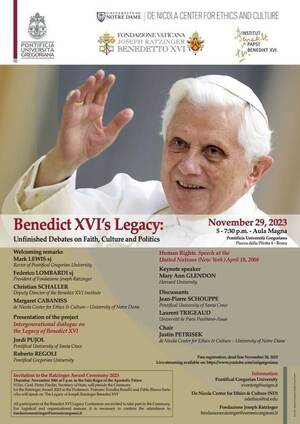
The de Nicola Center for Ethics and Culture, in partnership with the Ratzinger Foundation and the Benedict XVI Institute, has launched an international project on the intellectual legacy of Pope Benedict XVI, in an effort to encourage intergenerational dialogue on the discussions begun during his pontificate.
The launch event, titled “Benedict XVI’s Legacy: Unfinished Debates on Faith, Culture, and Politics,” was held on November 29, 2023, at the Pontifical Gregorian University in Rome, coinciding with the presentation of the annual Ratzinger Prize at the Vatican. Rev. Federico Lombardi, President of the Ratzinger Foundation and former director of the Holy See Press Office, spoke at both events and highlighted of the importance of the joint effort.
“The legacy of Benedict XVI remains alive and fruitful in the life of the Catholic Church," Father Lombardi noted. "Indeed, we continue to reflect and become ever more aware of the importance of his cultural and spiritual heritage for the Church and the world.” (Watch video of the introductory remarks here.)
In her introductory remarks, Margaret Cabaniss, senior associate director of the de Nicola Center, said that the Center's mission continues to be inspired by the example of Pope Benedict XVI.
“Through his extensive writings and public interventions throughout his papacy, Pope Benedict demonstrated a commitment to bringing the fullness of the Church’s tradition into fruitful discourse and exchange on the most pressing and vexed questions surrounding ethics, culture, justice, freedom, and human dignity today,” she added.
The November event featured a presentation by Mary Ann Glendon, the Learned Hand Professor of Law, emerita, at Harvard University and Permanent Senior Distinguished Research Fellow at the de Nicola Center, on the impact of Pope Benedict XVI’s 2008 speech to the United Nations. In her reflections, Glendon described the pontiff's speech as “the most cautionary, sober, discussion of human rights that has ever been issued from a papal pen before or since.”
Glendon went on to analyze five of the “ten threats to the human rights project” that the pontiff underlined in his speech, noting the continuing relevance of the pope's questions about the foundations of human dignity and the increasing push for rights that have “neither broad consensus around the world nor firm grounding in international law.”
Professors Jean-Pierre Schouppe (Pontifical University of Santa Croce) and Laurent Trigeaud (Université de Paris Panthéon-Assas) offered responses following Professor Glendon's remarks, highlighting particularly Pope Benedict's call for Christians to engage in public debate on the concept of human dignity and his reminder to the UN assembly of their collective responsibility to intervene in cases of mass atrocity. (Watch video of the three scholars' remarks here.)
The de Nicola Center will continue the conversation at a conference to be held at the University of Notre Dame April 8–9, 2024, the second installment of this international and intergenerational project. This conference, one of the first to focus on the late pontiff's legacy following his passing in 2022, will feature both emeritus and emerging scholars from around the world who will engage six of the most influential addresses delivered by Pope Benedict during the course of his papacy. Speaker information and registration details will be posted at ethicscenter.nd.edu/events/.
“Pope Benedict’s thought continues to animate our discussions on faith and reason, the nature of law, human rights, ethics, culture, and technology,” said Justin Petrisek, research and publications program manager for the de Nicola Center. “Not only do we get the privilege of carrying on this interdisciplinary discussion, but we get to hand on the conversation to a new generation of passionate intellectuals, many of whom are right here at Notre Dame.”
Students and young scholars will also be afforded the opportunity to participate in the conference through an essay contest. Selected essays will be awarded cash prizes and invited to present at the conference (submission deadline March 1, 2024). For more information on the conference and essay contest, contact Justin Petrisek (jpetrise@nd.edu).
